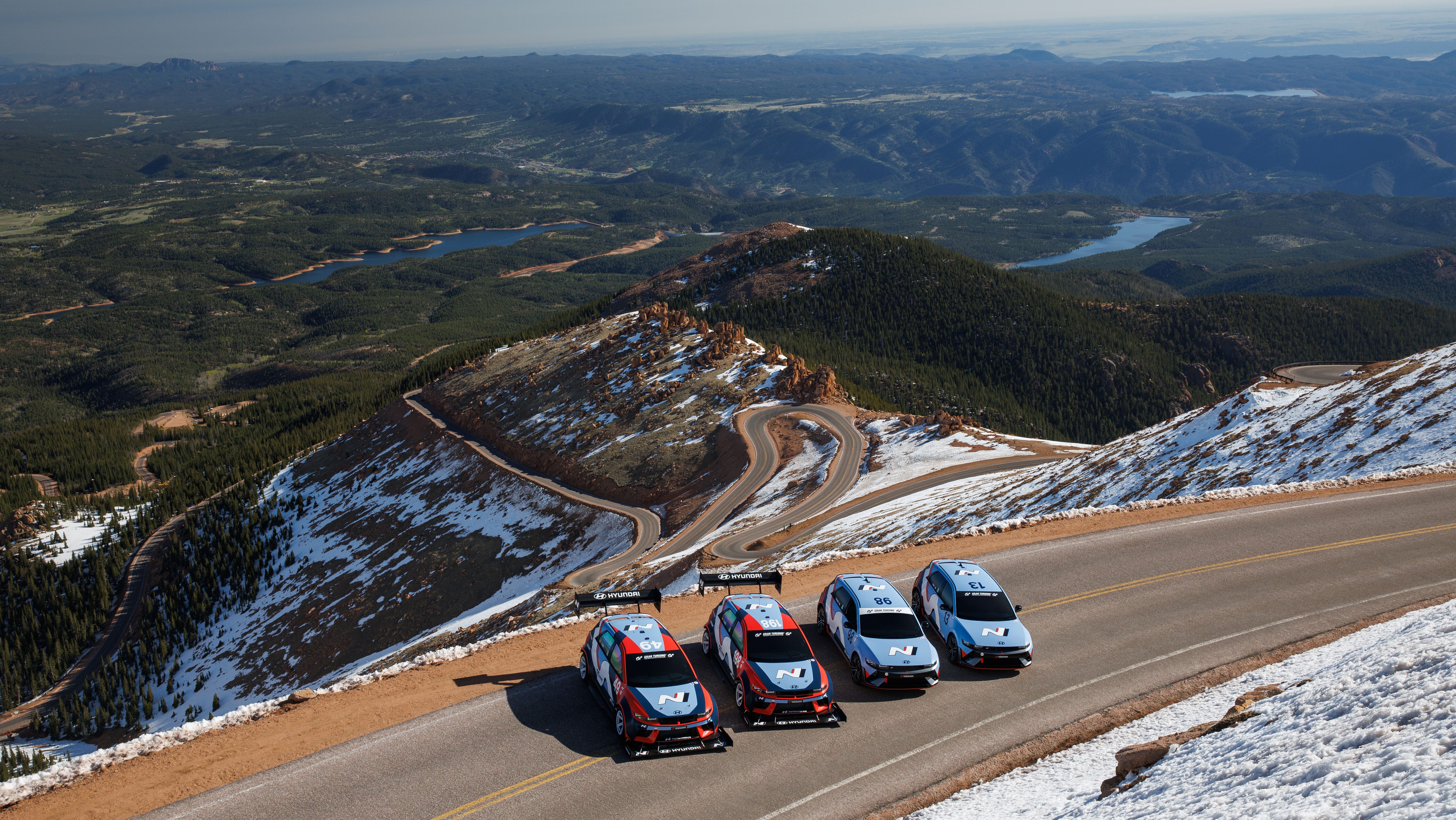
The Pike’s Peak International Hill Climb had its 102nd running today, and several EVs which set out to post new records have done so today, with the Rivian R1T and Ioniq 5N both claiming records, and the Ford SuperTruck being the fastest vehicle up the hill on the day.
The Pike’s Peak International Hill Climb is one of the longest-running races in the world, being held 102 times since 1916.
It’s a famously difficult race, starting at an already-high 9,390ft (2,862m) in elevation and finishing at 14,110ft (4,300m), with an average 7.2% vertical grade. Until 2011, the track was largely unpaved on dirt or gravel roads, and it is not uncommon for cars to leave the track and crash into the woods or, worse, end up tumbling down the mountain. The race is also commonly stopped by rain, snow, fog, or other inclement weather of the type you commonly get at the top of mountains.
In particular, the high altitude nature of the race (which earned it the nickname “Race to the Clouds”) has always been difficult, because at high altitudes there is less oxygen, which means less complete combustion of fuel. This means that gas-powered race vehicles need to have incredibly oversized engines to do well.
That difficulty does not apply to electric vehicles since EVs don’t need oxygen for combustion, so for years EVs have overperformed in the race. Currently the all-time record for the 12.42-mile (20km) hillclimb is 7:57.148, set by the Volkswagen ID.R in 2018. And this year, an EV (Acura ZDX) served as the pace car for the first time.
There were 3 notable electric entries this year: the new higher-powered Rivian R1T Ascend Quad Max in unmodified form, the Hyundai Ioniq 5N in both stock and modified specs, and the bonkers heavily-modified Ford F-150 Lightning SuperTruck. (All vehicles do have seats stripped from the interior and roll cages/fire extinguishers added for safety purposes, but this doesn’t change total vehicle performance much due to the weight of the roll cage).
Last year, Rivian set the record for production trucks, gas or electric, with a 11:23.983, also putting it ahead of past runs by the likes of Faraday Future and a Tesla P90D. But it wasn’t an electric production record, as that was held by a Model 3 Performance with an 11:02.802.

However, with the R1T’s 190hp power boost over last year’s model, Rivian was hoping to gain some time – and boy, did it.
Driver Gardner Nichols managed to set a time of 10:53.883, shattering last year’s time by half a minute, setting a new record for any production truck, gas or electric, and even beating the 2018 Model 3 Performance by about ten seconds (though the new Model 3 Performance hasn’t run up the hill yet).
In fact, the R1T’s time would have been an overall record for unmodified electric vehicles – and even was that record, for a few minutes – until the next car up the mountain, the Ioniq 5N, came in 4 seconds faster.

Hyundai ran the 5N in two classes, aiming for both modified and unmodified records (one of its four vehicles had a crash in practice). Immediately after the R1T finished, Ron Zaras set a 10:49.267 in an unmodified Ioniq 5N, setting the record for electric production vehicles.
Unfortunately the 5N just barely missed the record for production SUV – currently held by the 2018 Bentley Bentayga at 10:48.902, only 3 tenths ahead over the course of this 12.42-mile track. If only Zaras hadn’t had that second donut this morning…
And in the modified category, the Ioniq 5N TA (“Time Attack”) spec, which carries over the stock powertrain but has some software tweaks for more power and big wings on the front and back, was piloted by Dani Sordo to set a 9:30.852, which is now the fastest electric modified SUV up the mountain.
Notably, the modified 5N also beats the modified Model S Plaid, which set a best time of 9:54.901. Driver Randy Pobst, who drove the Plaid and drove the second 5N today, reportedly said that he would need to manage temperatures of the Plaid as its battery would start to derate at the end of the brutal climb, but that Hyundai told him that he could stay at 100% for the whole run without worrying about temperature throttling.
The Plaid’s run was a privateer effort by Unplugged Performance, not a manufacturer effort like Hyundai’s, but it puts the 5N in rare company to be ahead of Tesla both in unmodified and modified form.

While the R1T was the fastest unmodified truck up the hill today, it wasn’t the fastest truck overall. That honor goes to the 1,400hp Ford F-150 Lightning “SuperTruck,” continuing the long tradition of silly Pike’s Peak vehicles with gigantic wings.
The SuperTruck set the fastest time of the day, with an 8:53.553, the only vehicle to go sub-9 and more than ten seconds faster than the next-best finisher. And that was after the vehicle had an unexpected shutdown in the first sector, coming to a complete stop and needing to be repowered, losing almost half a minute in the process.
As a result, it didn’t set a record, as last year’s Ford SuperVan, a similarly-modified Ford Transit Electric, set a time of 8:47.682. That vehicle still holds the “Pike’s Peak Open” class record, and both were piloted by Romain Dumas (who also holds the overall record in the VW I.D. R).
So, all in all, another successful year for EVs at the mountain.
Below is the official race broadcast which was livestreamed on YouTube. If you’re looking for a specific run, here’s the official run order. The R1T and 5Ns went first (starting around 29 minutes into the broadcast – and if you hear exhaust noise from the 5N, that’s fake noise from external speakers), and the SuperTruck started around 2 hours 37 minutes into the broadcast.
Electrek’s Take
Both of these cars that set records this year are extremely impressive.
I asked Rivian if they thought they could get sub-11 minutes, but all they committed to was trying to beat their record from last year.
Top comment by Grant
Thanks for the post and coverage Jameson. These type of events push the envelope and are great fun. I'm glad the EVs are doing so well.
But the fact that a 7,000+ pound truck managed to beat even the 2018 Model 3 Performance, and come in just 4 seconds behind the 5N, is quite exceptional. That’s a lot of weight to push up a mountain and around all those curves, and the R1T is simply not a sportscar. I’m sure that the new Model 3 would be quicker than the last, and there have been faster Teslas up the hill in modified form, but these vehicles aren’t even close to being in the same class – so the R1T has achieved a pretty incredible feat here.
It’s a shame that the Ioniq 5N couldn’t have been just a tiny bit quicker to beat the Bentayga – but it also costs less than 1/3 as much as the Bentayga. The fact that you can go right out and buy an Ioniq 5N, for a pretty reasonable price, and have an SUV that beats every other electric vehicle ever to go up the mountain and almost every other SUV/crossover, with a sub-11 minute time on this famously difficult race, is extremely impressive. (Perhaps if it had diverted that power to run the silly fake motor noise speakers into the motors instead, it could have saved three tenths…)
Hyundai has only just started pushing the electric performance envelope, but we’re pretty excited to see where this goes.
(And speaking of Rivian, and of electric crossovers in a rally competition, can you just imagine what the Rivian R3X is going to look like up this hill in a few years?! Stay tuned!)
FTC: We use income earning auto affiliate links. More.





Comments